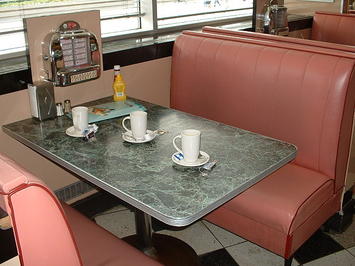
Grub Street posted another installment in the decline of the New York diner genre.
I’ve made the point before that many of these old line institutions are going out of business because their product simply isn’t very good. I’m a fan of diner food, but I’ve never had a good meal in a Manhattan diner.
But there are many other forces at work, including changes in the structure of our society. One thing the disappearance of diners illustrates is the loss of shared social infrastructure spanning across social classes.
Something I’ve always liked about diners is that they are the kinds of places that you could find people from all walk of life. There were cops and blue collar workers, college students, professionals grabbing breakfast, etc. It was the kind of institution that was broadly patronized across social groups.
These kinds of institutions are in decline. There has a been fragmentation of the shared American common culture that existed as recently as 1990 into a multiplicity of niche markets.
There’s also been a gulf that has opened between the consumption and cultural practices of the upper middle class (the top 20% by education and income) and everyone else. They shop in different stores, eat in different restaurants, drink different beers, etc.
There are fewer of the spaces were classes intersect as they did in diner. There are still NYC restaurants where multi-class patronage does occur – pizza by the slice places and delis come to mind. Those are both great. But in my experience, in diners it’s more likely that people will actually strike up a conversation with others, and thus have real cross-class conversation, even if just idle banter.
So the decline of the diner is not just about the loss of a restaurant format – those come and go – but also the decline of shared social space and the increasing alienation between social classes and groups.
You might also like: The fact that you get to interact in a positive way with people of so many different backgrounds is why I love jury duty.
This piece originally appeared on Urbanophile.
Aaron M. Renn is a senior fellow at the Manhattan Institute, a contributing editor of City Journal, and an economic development columnist for Governing magazine. He focuses on ways to help America’s cities thrive in an ever more complex, competitive, globalized, and diverse twenty-first century. During Renn’s 15-year career in management and technology consulting, he was a partner at Accenture and held several technology strategy roles and directed multimillion-dollar global technology implementations. He has contributed to The Guardian, Forbes.com, and numerous other publications. Renn holds a B.S. from Indiana University, where he coauthored an early social-networking platform in 1991.
Photo Credit: Coyote-mania, CC BY-SA 3.0












